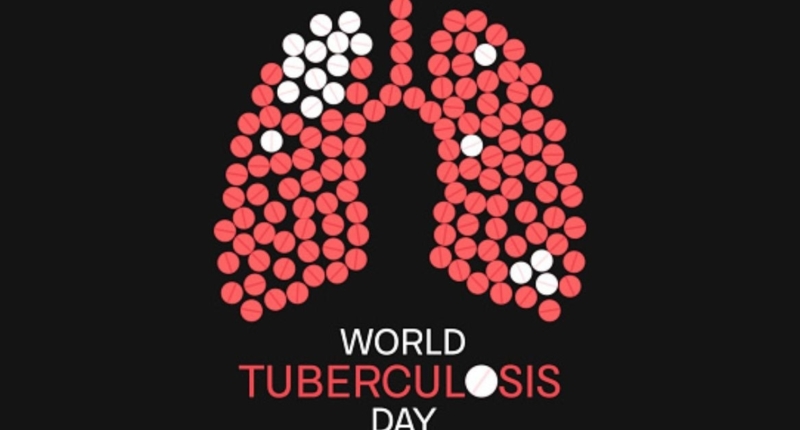India has been significantly impacted by tuberculosis, with 3 million new cases and 11,000 deaths among individuals living with HIV reported in 2021. To combat tuberculosis, it is crucial to focus on the elderly, children, and young people. Effective infection control measures can help break the chain of transmission at homes, communities, and healthcare facilities. To treat tuberculosis, a combination of medicines is necessary, but drug-resistant tuberculosis is a growing concern. However, new treatments such as bedaquiline, pretomanid, and delamanid have been shown to be effective. In addition, the lack of access to tuberculosis diagnostic kits is a problem that needs to be addressed. The best diagnostic tests should be free and easily accessible to those who need them, to enable effective treatment to begin without delay.
World Tuberculosis Day: Urgent Actions Needed To End Tuberculosis In India By 2025, Expert Says.
Tuberculosis is a bacterial disease caused by Mycobacterium tuberculosis, which primarily affects the lungs but can also attack other parts of the body such as the kidney, spine, and brain. Today, March 24, marks World Tuberculosis Day, which commemorates the discovery of Mycobacterium tuberculosis by German physician Dr Robert Koch in 1882.
The purpose of this day is to increase public awareness of tuberculosis’s worldwide impact and to emphasize the severe health, social, and economic consequences of the disease. Furthermore, the day intends to highlight the efforts made to stop the global tuberculosis epidemic.
The theme for this year’s World Tuberculosis Day, “Yes! We can end TB,” strives to inspire hope and encourage increased investments, high-level leadership, faster adoption of WHO recommendations, innovation adoption, accelerated action, and multisectoral collaboration to combat tuberculosis. At the 2023 UN High-Level Meeting on TB, experts aim to raise visibility and political commitment to the disease.
According to the World Health Organization’s Global TB Report, tuberculosis rates in India have decreased by 20% between 2015 and 2021, and death rates from the disease have decreased by approximately 7% in the country during the same period. On World Tuberculosis Day, the Global TB Summit is being held in Varanasi, India.
India is striving to eradicate tuberculosis by 2025, five years ahead of the global goal to eradicate the disease as a public threat. Prime Minister Narendra Modi announced this target. Dr. Ishwar Gilada, Consultant in HIV and Infectious Diseases and Secretary General of People’s Health Organization, praises India’s ambitious mission to eliminate TB five years earlier than the global target. Dr. Gilada highlighted the fact that India now has diagnostics for drug-resistant TB in every district, whereas there were only a few national reference laboratories 10 to 15 years ago, which is a significant leap forward. Indian pharmaceutical companies have also played a significant role in delivering life-saving tuberculosis medicines at reasonable prices, according to Dr. Gilada.
Urgent Actions Needed To End Tuberculosis In India By 2025, Expert Says
Tuberculosis is a highly contagious bacterial disease that primarily attacks the lungs, but it can also affect other organs such as the kidney, spine, and brain. Drug-resistant tuberculosis is a condition in which the person with tuberculosis is resistant to at least isoniazid and rifampin, the two most potent tuberculosis drugs. According to Dr. Ishwar Gilada, the number of people diagnosed and treated with drug-resistant tuberculosis has increased over the past decade.
Dr. Gilada has also lauded India’s leadership in tuberculosis research, stating that several clinical studies, including those on potential tuberculosis vaccines, are in their final stages. The National Institute for Research in Tuberculosis, Indian Council of Medical Research (ICMR), may release the results of these studies this year.
India has demonstrated leadership in scaling up access to tuberculosis prevention, diagnostics, treatment, and care through its domestic capacity to produce and supply the best tuberculosis medicines and diagnostics. However, Dr. Gilada emphasized the need for much stronger actions with a sense of urgency and purpose to end TB by 2025 in India.
Tuberculosis rates need to decline more steeply than the current rate of annual tuberculosis decline, and tuberculosis deaths also need to reduce quickly. The National Tuberculosis Elimination Programme of the Government of India has shown promising results, and the public-private partnership model of the program is very effective, according to the PHO.
Tuberculosis is the deadliest infectious disease in India, accounting for over half-a-million deaths in 2021. However, social stigma remains a significant challenge, particularly for people with multidrug-resistant tuberculosis.
In conclusion, while India has made significant strides in tuberculosis prevention and treatment, there is still a need for urgent action to eliminate tuberculosis by 2025.
Focusing On Urgent Actions To End Tuberculosis In India
India has been significantly affected by tuberculosis, with three million new cases reported in 2021. Of these cases, 54,000 were people living with HIV. Furthermore, India accounted for 38% of the total number of tuberculosis deaths worldwide in 2021, with 11,000 of these deaths being among individuals living with HIV. According to PHO, tuberculosis is the biggest cause of death among people living with HIV.
Dr. Gilada noted that it is unacceptable because tuberculosis can be prevented, diagnosed, and treated, even among people living with HIV. Additionally, PHO emphasized the importance of focusing on children, young people, and the elderly to end tuberculosis. In 2021, one out of every ten individuals with tuberculosis in India was under 14 years of age, and one out of every five individuals was above 55 years of age.
However, one-third of these elderly individuals could not access tuberculosis services or were not notified to the National Tuberculosis Elimination Programme, according to PHO. Effective infection control practices can break the chain of transmission at homes, communities, and healthcare facilities.
To treat tuberculosis, people must receive a combination of medicines to which they respond. Due to drug-resistant tuberculosis, medicines have become ineffective. In 2021, about 119,000 new cases of multidrug-resistant tuberculosis were reported in India, with less than half of these individuals receiving treatment. Recent research has shown that all-oral treatment of drug-resistant tuberculosis can be safer, shorter, and more effective than the previous treatment method of administering tuberculosis patients with injectables for two years.
New medicines such as bedaquiline, pretomanid, and delamanid have been found to be safe and effective. Combination regimens such as bedaquiline, pretomanid, and linezolid (BPaL), and bedaquiline, pretomanid, linezolid, and moxifloxacin (BPaLM) have shown potential. However, BPaL is still in pilot mode in India.
According to Dr. Gilada, the lack of access to tuberculosis diagnostic kits is another issue faced by people worldwide. The best diagnostic tests should be free and easily accessible to detect TB disease as well as to determine which drugs a person may be resistant to. This will enable effective treatment to begin without delay.
Don’t miss interesting posts on Famousbio









